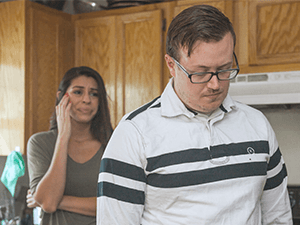Sex Addiction Hotline
 Contacting a sex addiction hotline can help you or a loved one learn about your treatment options and find a program. Like drug and alcohol addiction, sex addiction can be difficult to talk about and may cause feelings of guilt and shame. Fortunately, resources are available to help address the problem without judging the behavior.
Contacting a sex addiction hotline can help you or a loved one learn about your treatment options and find a program. Like drug and alcohol addiction, sex addiction can be difficult to talk about and may cause feelings of guilt and shame. Fortunately, resources are available to help address the problem without judging the behavior.
If you or a loved one is suffering from an addiction to sex, you are not alone. Approximately 3% to 6% of American adults suffer from the disorder.2 These people may also be addicted to other substances or behaviors, such as drugs, alcohol, and gambling. In fact, around 50% of sex addicts also suffer from drug and alcohol addiction.2 Seeking help for sex addiction can help you deal with other problematic behaviors.
If you or someone you know might be addicted to sex, call our helpline at . Our representatives can assist you with finding a rehab.
Are You Addicted to Sex?
Signs and symptoms of sex addiction vary from person to person. You may have a problem if you have difficulty controlling impulses to engage in sexual behavior, experience tension prior to sexual behavior, and feel a sense of relief and pleasure while engaging in the behavior.3
There are no formal criteria used to diagnose sex addiction. However, researchers have proposed the following set of signs and symptoms:3
- Preoccupation with sexual thoughts or fantasies.
- Participation in a sexual behavior more often or for a longer period of time than intended.
- Failed efforts to try to stop the behavior.
- Spending large amounts of time preparing for, engaging in, or recovering from the sexual behavior.
- Participation in the sexual behavior at a time that a person should be caring for other occupational, academic, or social responsibilities.
- Giving up activities that were once important because of the sexual behavior.
- Continuing to engage in sexual behaviors despite knowledge that the behaviors cause health, financial, or relationship problems.
- Tolerance: a need to increase the intensity or frequency of sexual behaviors to achieve the desired effect, or experiencing less of an effect with the same behaviors over time.
- Feeling restless or irritable when one cannot engage in the sexual behavior.
 Other signs include:1
Other signs include:1
- Engaging in risky sexual behaviors, such as repeatedly having unprotected sex.
- Risking the loss of a primary relationship or marriage.
- Risking negative consequences, such as job loss, despite having had warnings about the behavior.
- Participating in illegal sexual activities such as prostitution, having sex with minors or individuals who do not provide consent, or having sex in public places.
Sex addiction may lead to short- and long-term consequences such as:1
- HIV, hepatitis, and other sexually transmitted diseases.
- Unplanned pregnancy.
- Physical and/or sexual abuse, including rape.
- Injuries to the genitals, breasts, colon, and other body parts.
- Physical accidents.
- Unnecessary surgeries or steps to enhance a person’s physical appearance.
- Drug and alcohol abuse.
- Abuse of sexual-performance-enhancing drugs.
- Emotional distress, including feelings of guilt, shame, depression, anxiety, and fear.
- Post-traumatic stress disorder.
- Divorce, separation, and other relationship problems.
- Job loss.
- Arrests and other legal issues.
- Financial problems.
Seeking help sooner, rather than later, can reduce the risk of negative consequences.
Calls to our hotline are free and anonymous. Helpline staff are available 24 hours a day, 7 days a week, to assist you. Call today at .
Why Call a Sex Addiction Hotline?
 Calling a sex addiction hotline can help you take the necessary steps to get better. People with this addiction often feel helpless and out of control. In some cases, the addiction may progress over time, leading to more negative consequences.1 Seeking help can prevent long-term consequences, including physical and mental health problems, legal issues, and interpersonal relationship issues. With the proper help, addiction to sex is treatable.
Calling a sex addiction hotline can help you take the necessary steps to get better. People with this addiction often feel helpless and out of control. In some cases, the addiction may progress over time, leading to more negative consequences.1 Seeking help can prevent long-term consequences, including physical and mental health problems, legal issues, and interpersonal relationship issues. With the proper help, addiction to sex is treatable.
Our helpline for sex addiction is staffed with trained representatives who can provide information on different treatment options and help you decide how to pay for treatment. They can also help you identify the necessary steps to getting into a program.
What if I’m Afraid to Call?
It’s normal to feel afraid when trying to reach out for help. Some people also feel guilty, ashamed, or worried that they will be judged.
All calls to our helpline are anonymous and completely confidential. Our hotline operators speak to many people each day with different kinds of addictions and will not judge you. Their goal is to connect you with the right treatment center to help you overcome your addiction.
Reaching out for help shows strength rather than weakness. Remember that you are taking a big step to better your future.
Getting Ready to Call
Phone representatives may ask specific questions to help you find the right treatment program. Before calling any helpline, you may want to consider:
- The severity of your addiction, including what types of symptoms you are experiencing.
- The amount of time that you have been experiencing these symptoms.
- How these symptoms affect your health and relationships.
- Whether you are also experiencing other mental health symptoms or addictions.
Before calling for help, you may also want to write down any questions you would like to ask. Common questions include:
- Where is the treatment center located?
- How long is the program?
- Does the program also treat mental health conditions, substance abuse, or other addictions?
- Does the program offer group, individual, and family therapy?
- What is the treatment center’s philosophy on treating addiction?
- How much will treatment cost me?
- Are payment plans available?
- What are the policies on having visitors, making phone calls, and using electronic devices?
If you’re ready to talk to one of our representatives, call now.
Making the Call
 When you reach out to a sex addiction hotline, you will speak with a trained representative who will ask you questions, such as the following:
When you reach out to a sex addiction hotline, you will speak with a trained representative who will ask you questions, such as the following:
- What symptoms are you experiencing?
- How long you have been addicted to sex?
- Have you tried getting help for your sex addiction in the past?
- How do your symptoms impact your health and relationships?
- Do you use drugs or alcohol, or engage in other addictive behaviors such as unhealthy eating?
- Do you suffer from mental health issues, such as anxiety, depression, or post-traumatic stress disorder?
Once the representative has an idea of the severity of your addiction, he or she will discuss your treatment options. The hotline representative will then assist you with selecting a program.
Sex addiction treatment may take place in different settings:
- Inpatient treatment is the most intensive form of help for sex addiction. This type of program allows you to stay in a facility for a period of time. During the course of your stay, you will participate in therapy sessions and other activities to help you understand your addiction and gain control over your behaviors.
- Outpatient treatment programs provide therapy and support for a specific number of hours each week. Unlike inpatient treatment, program participants reside at home, rather than a facility.
Certain factors that may influence your decision about a program include:
- Location of the facility.
- Length of treatment.
- Cost.
- Type of care.
- Amenities offered.
At the end of the phone call to the sex addiction hotline, you will have found a rehab facility that matches your needs.
Helpline Resources
Other hotlines and resources available to those in need include the following. These helplines can offer support over the phone or direct you to resources in your area for behavioral addictions, substance abuse, and mental health conditions, such as treatment centers, therapists, and support groups.
- SAMHSA’s Behavioral Health Treatment Services Locator offers an online search tool of local substance abuse and mental health treatment programs in the United States. The hotline can be reached at 1-800-662-HELP (4357). Representatives are available 24 hours a day and can provide assistance in English and Spanish.
- Boys Town National Hotline offers help for children, adolescents, parents, and families in crisis. Counselors are available 24 hours a day and can offer assistance in English and Spanish.
- The National Suicide Prevention Lifeline is a confidential resource for anyone who is in crisis or contemplating suicide. Trained counselors can offer support, guidance, and provide referrals for treatment. The Lifeline offers help 24 hours a day.
- The National Alliance on Mental Illness (NAMI) Helpline offers information on mental health symptoms, treatment programs, and local support groups. Volunteers can be reached at 1-800-950-NAMI (6264), Monday to Friday from 10 a.m. to 6 p.m., Eastern Time.
- Sex Addicts Anonymous (SAA). SAA is a peer-to-peer support group based on the same 12 steps of recovery as Alcoholics Anonymous. Meetings are free, and the only requirement to attend is a desire to stop addictive sexual behavior. Other 12-step programs for sex addiction include Sexaholics Anonymous and Sex and Love Addicts Anonymous.
Sources
[1]. Schneider, J. P. (2004). Understanding and diagnosing sex addiction. In R.H. Coombs (Ed.), Handbook of addictive disorders: A practical guide to diagnosis and treatment (197-232). Hoboken, NJ: John Wiley & Sons.
[2]. Sussman, S., Lisha, N., & Griffiths, M. (2011). Prevalence of the addictions: A problem of the majority or the minority? Evaluation & the Health Professions, 34(1), 3-56.
[3]. Goodman, A. (1993). Diagnosis and treatment of sexual addiction. Journal of Sex & Marital Therapy, 19(3), 225-251.

